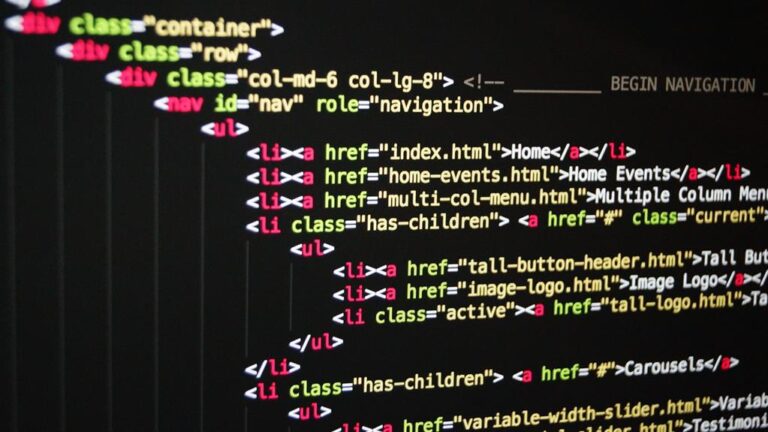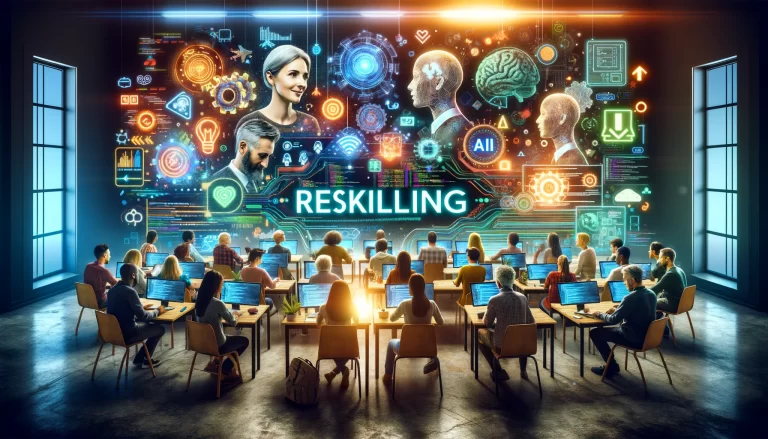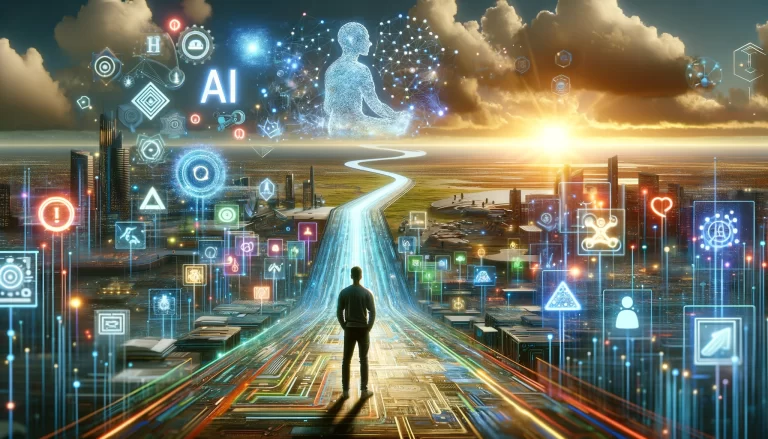In a world where robots haven't yet mastered the art of sipping coffee with existential dread, I figure there's still a place for us humans to shine. To close the AI era gap, I've learned to get cozy with AI fundamentals—understanding the very algorithms that might one day steal my job. I've sharpened my data literacy because, let's face it, data's the new currency, and I intend to be rich in knowledge. I've amped up my technical skills, not just to keep up, but to lead the charge. Creativity's my secret weapon, as machines can't quite catch the nuance of a well-spun story. I'm all about adaptability, rolling with the punches in a landscape that never stops changing. And emotional intelligence? That's my ace in the hole, connecting with others in ways AI can't fathom. These are the skills I hone; they're my keys to liberation in the AI era.
Understanding AI Fundamentals
As an AI enthusiast, my foray into machine learning basics serves as the bedrock for bridging the knowledge gap in this rapidly advancing field. Grasping the core principles of AI isn't just a technical necessity—it's a step towards empowerment in an era where artificial intelligence reshapes every aspect of our lives. By understanding the algorithms that underpin machine learning, I'm not just decoding a set of instructions; I'm unlocking the potential to shape technology in a way that aligns with our collective quest for freedom and progression.
Machine learning isn't a black box—it's a tool, one that we can wield with precision to not only solve complex problems but also to ensure that the solutions we create are just and equitable. This is where AI ethics becomes crucial. It's not enough to know how to build intelligent systems; I must also understand the moral frameworks that govern their use. AI ethics isn't ancillary—it's integral to the development of technology that serves humanity, rather than the other way around.
Developing Data Literacy
Building on my understanding of AI fundamentals, I'm now turning to the crucial skill of developing data literacy to further narrow the AI era gap. This isn't just about becoming adept at using data; it's about empowering myself to navigate through an increasingly data-driven world with confidence and autonomy.
To truly harness the power of data, I know it's essential to focus on:
- Grasping Data Visualization: Understanding how to interpret and create visual representations of data is key. This allows me to quickly identify trends and patterns that might be invisible in raw numbers.
- Mastering Information Management: It's one thing to access data, but another to manage it effectively. I strive to organize, store, and retrieve data efficiently, ensuring that the information I need is at my fingertips when I need it.
- Critical Analysis: I'm honing my ability to scrutinize data sources and results critically. This helps me to avoid being misled by misinformation or bias, leading to more informed decisions.
Data literacy is a form of liberation, freeing me from the potential constraints of ignorance and enabling me to make decisions based on evidence rather than assumption. By enhancing my skills in data visualization, I can communicate complex information succinctly and clearly. Through effective information management, I ensure that the wealth of data available serves me, rather than overwhelms me.
The road to data literacy may be challenging, but it's one I'm committed to traveling. It's not just a professional necessity; it's a personal imperative in an age where data is as valuable as currency.
Enhancing Technical Proficiency
As we turn our focus to enhancing technical proficiency, it's clear that I'll need to ramp up my skills in coding and data analytics. These competencies are vital for anyone looking to thrive in an AI-driven landscape. I'm set on mastering these tools to not just keep up, but to excel in the future job market.
Acquiring Coding Expertise
I'm brushing up on my programming skills to ensure I can navigate the complexities of the AI era with confidence. To thrive in this transformative period, I'm focusing on:
- Algorithm Comprehension: Understanding the logic behind algorithms is crucial. It's about grasping how AI processes information, which empowers me to leverage its capabilities.
- Debugging Skills: I'm honing my ability to identify and fix errors, ensuring the smooth operation of AI applications.
- Continuous Learning: The tech landscape is constantly evolving. I commit myself to lifelong learning to stay ahead.
Mastering Data Analytics
Diving into data analytics, I'm equipping myself with the skills to interpret and manipulate vast datasets, a cornerstone of AI proficiency. It's about breaking free from the confines of guesswork and embracing the precision that data provides. By mastering data visualization, I can weave raw numbers into compelling stories that resonate and inform. It's not just about understanding what the data shows, but why it matters.
Statistical interpretation is my ally in this quest. It allows me to discern patterns, test hypotheses, and draw meaningful conclusions with confidence. With these skills, I'm not just reacting to an AI-driven world; I'm actively shaping it. I'm stepping into the future armed with the ability to turn data into decisions, unlocking potential and spearheading innovation.
Cultivating Creativity
In bridging the AI era gap, I've found that nurturing one's creativity is an indispensable skill. As we delve deeper into a world dominated by algorithms and data, it's innovative thinking and artistic exploration that can set us apart. These facets of creativity aren't just about making art, they're about envisioning new ways of solving problems and expressing our humanity in a landscape increasingly painted by the digital brush of artificial intelligence.
Here's how I keep my creative edge sharp in an AI-driven world:
- Embrace Diverse Experiences: I actively seek out novel situations that challenge my usual way of thinking. This can mean traveling to new places, trying out different art forms, or even just diversifying my reading list.
- Practice Mindfulness: By staying present and engaged with my surroundings, I can better observe and connect disparate ideas. This mindfulness often sparks a creative insight or perspective that I would've otherwise missed.
- Foster a Culture of Collaboration: Interacting with people from various backgrounds and disciplines provides a melting pot of ideas. I find that the fusion of different viewpoints often gives birth to the most innovative solutions.
To those of you thirsting for liberation from the mundane and the conventional, remember that creativity is your gateway. It's the path that leads away from the restrictive norms and towards a realm of endless possibilities. In a world where AI can replicate many of our tasks, it's the creative spirit that remains uniquely ours, a beacon of light guiding us through uncharted territories.
Embracing Adaptability
Adaptability has become my compass in the ever-shifting landscape of the AI era, enabling me to navigate changes with agility and resilience. As I embrace the continuous evolution of technology, I've learned that change readiness isn't just a skill—it's a mindset that empowers me to stay ahead of the curve. I've come to understand that my ability to adapt is not just about surviving; it's about thriving in an environment where the only constant is change itself.
To me, resilience building has become second nature. It's about more than bouncing back from setbacks; it's about seeing challenges as opportunities for growth and innovation. In this era where artificial intelligence reshapes our lives and work at a dizzying pace, I've realized that clinging to old ways of thinking is akin to standing still on a moving walkway. I've got to keep moving forward, adapting to new realities, and reimagining what's possible.
I treat each day as a chance to learn something new, to adjust my course as needed, and to liberate myself from outdated practices that no longer serve me. My journey isn't about resisting the waves of change but rather learning how to ride them. By fostering adaptability, I'm not just closing the gap in the AI era; I'm setting sail towards a future where I am the captain of my own destiny, unbound by the fear of the unknown and exhilarated by the promise of what's to come.
Fostering Emotional Intelligence
As we navigate the complexities of the AI era, I've come to appreciate the value of emotional intelligence. It's not just about understanding my own emotions; it's also about empathizing with others, even when AI is part of the equation. I'm curious about how training in emotional IQ and recognizing nonverbal cues can bridge the gap between human and artificial interactions.
Empathy in AI Interactions
I've identified one critical skill that can significantly bridge the gap in the AI era: fostering empathy within AI interactions to enhance emotional intelligence. This skill is not just about making machines more human-like; it's about ensuring that human-AI collaboration is rooted in understanding and ethical considerations. To drive my point home, consider the following:
- Integrating Emotional Recognition: AI systems must learn from and adapt to human emotions, facilitating a more intuitive and responsive interaction.
- Ethical AI Deployment: Embedding empathy into AI requires a framework that prioritizes respect and dignity for all users.
- Continuous Learning and Adaptation: AI must evolve with societal values, ensuring that empathy remains a core component of technological advancement.
In fostering these qualities, we not only improve AI but also champion a future where technology amplifies our collective liberation.
Emotional IQ Training
Building on these three pillars, I'll now delve into how specific emotional IQ training can enhance our ability to work alongside AI effectively. We're not just coding machines; we're nurturing a symbiotic relationship with intelligent systems. Mindful listening isn't just a soft skill—it's our gateway to understanding and being understood, to fostering bonds with AI that respect our human essence.
Here's a snapshot of the elements critical to Emotional IQ Training:
| Aspect | Description | Benefit to AI Era |
|---|---|---|
| Mindful Listening | Tuning into verbal and non-verbal cues | Facilitates nuanced human-AI communication |
| Empathy Development | Cultivating an understanding of emotions | Inspires compassionate technology design |
| Self-Regulation | Managing one's own emotional responses | Ensures balanced human-AI collaboration |
Embracing these skills liberates us from fears of obsolescence, empowering us to dance with AI, not be overshadowed by it.
Recognizing Nonverbal Cues
In my pursuit to bridge the AI era gap, I've come to realize that mastering the art of recognizing nonverbal cues is indispensable. It's about fine-tuning one's emotional intelligence to discern what's unsaid yet conveyed through body language and facial expressions. The subtleties of gesture interpretation and facial recognition can tell a story that words often miss.
Here's why we need to focus on this skill:
- Gesture interpretation unlocks a deeper understanding of others' intentions and emotions.
- Facial recognition allows us to connect on a more empathetic level, fostering trust.
- Deciphering nonverbal signals can liberate us from misunderstandings and build stronger relationships.
Frequently Asked Questions
How Can Organizations Ensure Equitable Access to AI Education and TrAIning Across Diverse Demographics to Close the AI Era Gap?
To ensure equitable AI education, organizations could emulate a city-wide initiative offering free digital literacy workshops in multiple languages, fostering an inclusive curriculum. By prioritizing accessibility, we can empower communities traditionally marginalized in tech spaces. Providing tools and knowledge for all, regardless of background, is key in liberating us from digital divides, allowing everyone to navigate and shape the AI-driven future confidently and competently.
What Role Does Government Policy Play in Preparing the Workforce for the Challenges Presented by the AI Era?
I believe government incentives are pivotal in prepping our workforce for AI's challenges. Through policy adaptation, they can fund training programs and support educational reform. This isn't just about tech skills; it's about empowering everyone with the knowledge to thrive. Governments have the means to level the playing field, ensuring all of us, regardless of background, can face AI advancements head-on and liberated from the fear of being left behind.
How Can Employees in Non-Technical Roles Contribute to AI Initiatives and Bridge the AI Era Gap Within Their Organizations?
I believe fostering AI literacy and maintaining a collaborative mindset are essential for contributing to AI projects. It's not just about understanding the tech; it's about adapting our roles to work alongside AI, ensuring we're all moving forward together. By learning the basics and embracing teamwork, we can help bridge any gaps and drive innovation, empowering ourselves and our organizations in this rapidly evolving landscape. It's liberating, being part of the solution.
What Are Effective Strategies for Small Businesses With Limited Resources to Cultivate AI Skills Among Their Staff?
Diving headfirst into the AI revolution, small businesses can navigate the tech tide by forging AI partnerships and smart resource allocation. I'd focus on collaborative learning, perhaps by pooling resources for shared training programs. It's like planting a tech seed in fertile ground; with a bit of nurture, it can bloom into a fully-fledged AI skill set. That's the key to breaking chains and unleashing potential in this AI-driven epoch.
How Is the AI Era Shaping the Future of Job Roles and Industries That Have Traditionally Not Been Tech-Centric?
The AI era is transforming even non-tech industries, necessitating digital literacy and soft skills for future roles. I'm seeing a push for adaptability and problem-solving abilities. It's about empowering workers to thrive alongside AI, not just coexist. For liberation, we must champion education that bridges technology with humanity, ensuring everyone's equipped to navigate this shift, fostering an inclusive, tech-savvy workforce that's ready for whatever the AI future holds.



